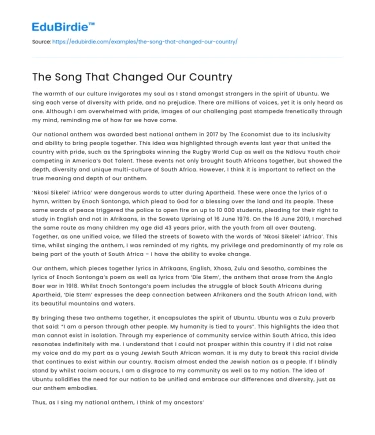The warmth of our culture invigorates my soul as I stand amongst strangers in the spirit of Ubuntu. We sing each verse of diversity with pride, and no prejudice. There are millions of voices, yet it is only heard as one. Although I am overwhelmed with pride, images of our challenging past stampede frenetically through my mind, reminding me of how far we have come.
Our national anthem was awarded best national anthem in 2017 by The Economist due to its inclusivity and ability to bring people together. This idea was highlighted through events last year that united the country with pride, such as the Springboks winning the Rugby World Cup as well as the Ndlovu Youth choir competing in America’s Got Talent. These events not only brought South Africans together, but showed the depth, diversity and unique multi-culture of South Africa. However, I think it is important to reflect on the true meaning and depth of our anthem.
Save your time!
We can take care of your essay
- Proper editing and formatting
- Free revision, title page, and bibliography
- Flexible prices and money-back guarantee
‘Nkosi Sikelel’ iAfrica’ were dangerous words to utter during Apartheid. These were once the lyrics of a hymn, written by Enoch Sontonga, which plead to God for a blessing over the land and its people. These same words of peace triggered the police to open fire on up to 10 000 students, pleading for their right to study in English and not in Afrikaans, in the Soweto Uprising of 16 June 1976. On the 16 June 2019, I marched the same route as many children my age did 43 years prior, with the youth from all over Gauteng. Together, as one unified voice, we filled the streets of Soweto with the words of ‘Nkosi Sikelel’ iAfrica’. This time, whilst singing the anthem, I was reminded of my rights, my privilege and predominantly of my role as being part of the youth of South Africa – I have the ability to evoke change.
Our anthem, which pieces together lyrics in Afrikaans‚ English‚ Xhosa‚ Zulu and Sesotho, combines the lyrics of Enoch Sontonga’s poem as well as lyrics from ‘Die Stem’, the anthem that arose from the Anglo Boer war in 1918. Whilst Enoch Sontonga’s poem includes the struggle of black South Africans during Apartheid, ‘Die Stem’ expresses the deep connection between Afrikaners and the South African land, with its beautiful mountains and waters.
By bringing these two anthems together, it encapsulates the spirit of Ubuntu. Ubuntu was a Zulu proverb that said: “I am a person through other people. My humanity is tied to yours”. This highlights the idea that man cannot exist in isolation. Through my experience of community service within South Africa, this idea resonates indefinitely with me. I understand that I could not prosper within this country if I did not raise my voice and do my part as a young Jewish South African woman. It is my duty to break this racial divide that continues to exist within our country. Racism almost ended the Jewish nation as a people. If I blindly stand by whilst racism occurs, I am a disgrace to my community as well as to my nation. The idea of Ubuntu solidifies the need for our nation to be unified and embrace our differences and diversity, just as our anthem embodies.
Thus, as I sing my national anthem, I think of my ancestors’ struggle to secure our land. I think of my anger towards my ancestors who imposed racist decrees unto my fellow South Africans. I remind myself of our unity despite our differences. I remind myself of our ability to embrace our combined culture. Ultimately , I remind myself that although discrimination in our land still exists, our anthem provides the hope that we can put an end to the judgement and prejudice, if we come together stand united as we live and strive for freedom in South Africa our land.






 Stuck on your essay?
Stuck on your essay?

